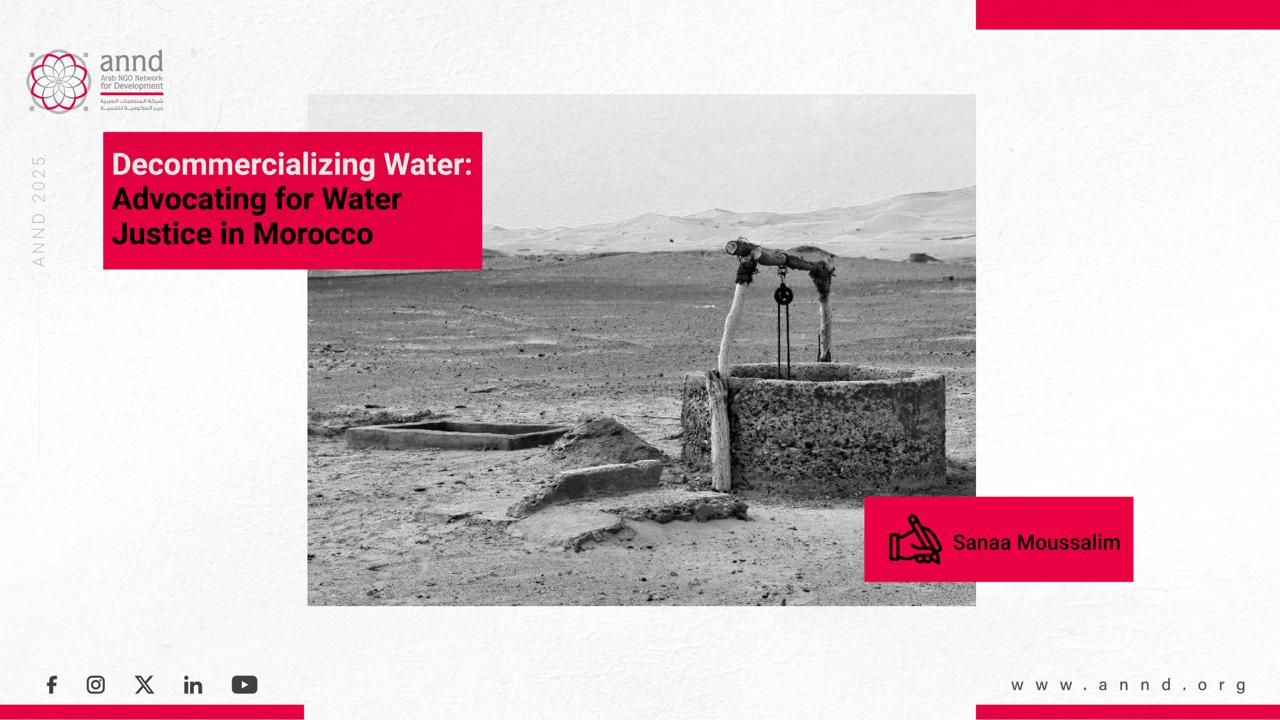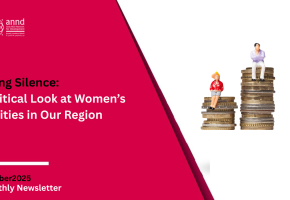Decommercializing Water: Towards Water Justice in Morocco - Sanaa Moussalim
Amid worsening environmental and climate challenges, Morocco's water crisis poses one of the most significant challenges at the intersection of social and developmental dimensions. Available water resources are experiencing an alarming decline due to successive years of drought, declining water quality, unsustainable exploitation and consumption patterns, and recurring waste and losses. Thus, the rise in popularity of technical and economic solutions such as seawater desalination and the expansion of export-oriented agriculture poses a fundamental question: Is water still viewed as an inalienable human right, or has it become managed as a scarce resource subject to market mechanisms and the values of profitability and cost?
Raising this question does not diminish the value of efforts in water resource mobilization or investments related to adaptation. Rather, it reflects the need for calm, collective reflection on ensuring sustainable water justice, guaranteeing the right to water for all, and considering environmental and spatial balances.
Water is not just an ecological or technical question; it is at the heart of social justice and human dignity.
The Right to Water without Legal Guarantee
Although Article 31 of the Constitution stipulates facilitating access to water, this right is not explicitly recognized in Moroccan legislation as "guaranteed," and there are no mechanisms for redress in the event of its violation . Law 36.15 on Water establishes the principle of integrated management and participation. However, it does not include any article obligating the state to guarantee a minimum level of quality, quantity, or performance capacity. Thus, conceptual ambiguity clouds this right, leaving it vulnerable to interpretations undermining its enforceability.
Rapidly Declining Water Resources in the Face of Climate Change
Morocco witnessed a sharp decline in its renewable water resources in recent decades. While per capita water availability exceeded 2,500 cubic meters per year in the 1960s, it now stands at no more than 620 cubic meters, with expectations of a drop to 500 cubic meters per capita by 2030—a threshold that places the country among the regions experiencing severe water stress. This decline is not only due to rising demand, but also to accelerating climate change, manifested in declining average rainfall, rising temperatures, and an increasing frequency of droughts, which have reached nine years over the past two decades.
Groundwater aquifers, a primary source of water in several regions, are also experiencing a steady decline, with data indicating a drop of between one and two meters annually in areas such as Berrechid, Souss, and Al Haouz. Despite efforts to monitor this decline, the phenomenon of uncontrolled well drilling continues to exacerbate the situation in the absence of effective monitoring or a robust deterrent system.
An Expensive Water Supply Faces the Limits of Its Effectiveness
Since the 1970s, Morocco has developed major infrastructure projects, such as dams and desalination plants, to ensure water security.
Indeed, more than 140 large dams have been constructed, and several projects have been launched to desalinate seawater and connect water basins. However, while contributing to expanding supply, this approach has now reached its limits for technical, environmental, and economic reasons.
Sedimentation in dams, the significant increase in maintenance and operating costs, and the decline in their filling levels have led to a substantial reduction in storage capacity. Desalination plants, while a strategic option in some regions, are limited by their high cost and reliance on traditional energy sources, making them unsustainable. Furthermore, they are primarily directed toward agricultural and tourism purposes, rather than meeting the needs of vulnerable populations.
Despite its scarcity, water continues to be depleted and wasted.
Despite the bleak water situation in Morocco, excessive exploitation of water resources, particularly groundwater, continues to increase. In many cases, it comes outside the legal framework and does not comply with the permits stipulated by law. This situation is met with an apparent failure by public authorities to impose oversight and implement effective monitoring mechanisms. While some Moroccan cities have witnessed repeated protests in recent years due to the so-called "thirst crisis," potable water in other cities is being used to irrigate green spaces and tourism projects, without regard for water use priorities or resource scarcity.
Meanwhile, unsustainable consumption patterns persist, particularly in the agricultural sector, which remains one of the most significant sources of pressure on water resources, given the absence of strict regulation of water use in high-consumption crops.
Localized Irrigation and Export Crops: Efficiency or Paradox?
Since its launch in 2008, the Green Morocco Plan has been a cornerstone for transforming Moroccan agriculture into a growth and job creation sector, through a dual approach that combines support for export-oriented agriculture with backing for solidarity agriculture.
According to the World Bank and the Economic, Social and Environmental Council, this approach has contributed to doubling agricultural added value from 65 to 125 billion dirhams between 2008 and 2018, achieving growth rates that exceeded those of the industrial and services sectors.
Morocco has made significant progress in developing highly competitive export chains, such as citrus, early fruits, and avocados. Localized irrigation expanded from 160,000 hectares to 585,000 hectares between 2008 and 2019, a technical achievement in water management.
However, these achievements have been accompanied by scientific and institutional criticism. Most notably, the adoption of localized irrigation has not reduced consumption but caused a "rebound effect," as the expansion of cultivated areas increased pressure on groundwater, rather than reducing it. In regions such as Souss, Tadla, and Berrechid, the expansion of water-intensive export crops, such as avocados and watermelons, has led to a sharp decline in groundwater levels.
The lack of social and spatial justice has also been criticized. Major investors have benefited from financing rates of up to 100%. However, small farmers, particularly in mountainous and marginal areas, have faced difficulties in accessing support and training.
Desalination: A Climate Necessity or a Commercial Option?
In light of increasing water scarcity and severe climate change, Morocco is rapidly investing in seawater desalination as a strategic option to meet its water needs, particularly in coastal areas. According to the Ministry of Equipment and Water, desalination production capacity reached approximately 606 million cubic meters in 2023, with a target of reaching 1.4 billion cubic meters annually by 2030, as part of the National Program for the Supply of Drinking and Irrigation Water 2020–2027.
However, despite the technical necessity of this approach, in light of the ongoing drought, it raises critical questions at the environmental and social levels. Most desalination projects lack comprehensive social and environmental impact assessments, making it difficult to measure their compatibility with the principles of sustainable development or spatial justice, as noted in the report of the Economic, Social and Environmental Council (CESE, 2021) in its assessment of water policy in Morocco.
Several studies also warn that "technocratic fixes" may mask the absence of structural reforms in water demand management and resource distribution among groups and regions. Relying exclusively on technical solutions without regulating consumption patterns (particularly in agriculture and tourism) contributes to the reproduction of the same patterns of imbalance and injustice.
Towards More Integrated Water Governance and Broader Spatial Justice
Despite legislative and institutional progress, the water governance system in Morocco continues to face several challenges. Water resources are managed by multiple actors (ministries, basin agencies, local authorities, regional institutions, etc.), amid weak coordination and without a unified strategic vision. Thus, the effectiveness of decision-making is impacted and accountability mechanisms become limited.
On the legal level, despite the issuance of Law 36.15 on Water, its implementation remains partial and does not yet provide sufficient tools for repression and deterrence. Data indicate that less than a quarter of recorded violations are prosecuted. In terms of participation, the contribution of local authorities and civil society to policy formulation and evaluation remains limited, deepening the trust gap between citizens and decision-making centers.
Between Privatization and Transparency: What is the Role of the State?
The expansion of the delegated management experiment in major cities (such as Casablanca and Tangier) has yielded mixed results. Without adequate oversight and accountability mechanisms, some cities have recorded sudden increases in water bills without citizen involvement or clear justification. Meanwhile, rural communities lack resources and capacity, negatively impacting the quality of water and sanitation services.
Alternatives Exist, But Require Will
Criticizing current policies does not mean rejecting technical solutions, but rather rejecting their restriction to market logic and the absence of justice. Reusing wastewater, expanding drinking water networks in villages, adopting pricing that takes into account vulnerable groups, and implementing participatory water governance are all possible alternatives. However, they require clear political will and the effective engagement of civil society and citizens. If Morocco wants to achieve a just environmental transition, it must rethink the relationship between the state and the citizen regarding water, based on it being a right, not a privilege, and a collective wealth, not a commercial resource. It requires:
● Regulating water-intensive agriculture and linking public support to environmental and social conditions;
● Explicitly incorporating the right to water into national legislation;
● Empowering vulnerable groups to representation on councils and institutions responsible for water management;
● Reforming the water pricing system to ensure fairness and purchasing power;
● Activating an independent and effective water police force capable of deterring the illegal exploitation of resources.
Building water justice in Morocco is not just about laws, but the radical transformation of policies and institutions, implementing the principles of transparency and accountability, and expanding citizen participation. Only this path can place water at the heart of a human development project that resists injustice and believes in dignity.


